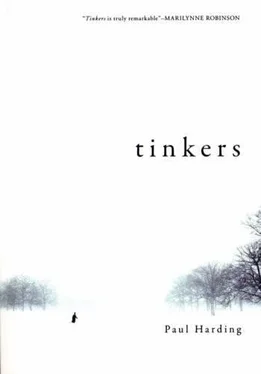George returned to the mouse and wrapped it in newspaper and bound the shroud tightly with kitchen string. He stuffed the wrapped mouse into an empty box of kitchen matches. Howard smelled kerosene and understood that his son had soaked the newspaper with it.
There was a small pond through the woods behind the yard. It was a stopping place for two pairs of ducks and a small flock of Canada geese every year. Its depth was no more than five feet at its deepest. Sometimes, George fished there and caught small brook trout, which he cooked over a fire he made at the edge of the water. If it was a Saturday, he fished at sundown, when, during the early summer, there were mayfly and drake hatches that brought the trout up to the surface to feed. At some point, bats would flit from the darkness out over the water to feed on the insects. George would stop fishing then, because the bats struck at his fishing fly and he had terrible notions of a frantic squeaking bat impaled on the barbed hook, trying to free itself and only breaking its own fragile wings in the process. Grabbing the bat and yanking the hook out would be unthinkable, so the only choice seemed as if it would be to run away, leaving the struggling animal on the end of the line, and to return the next morning to collect the rod and hope that a fox had happened along and eaten the bat (and not swallowed the hook along with the bat, so that it, too, now struggled somewhere in the woods, dragging the fishing pole by the taut line that now ran from its gut up through its throat and tore at the side of its mouth). So, when the bats came out, George cooked what fish he had, if he had any, and watched darkness settle and then went home.
George walked to the water and Howard followed silently behind at a distance. At the edge of the water, George cut a panel of bark from a birch tree with his jackknife. He sewed the bark together at each end with a heavy sewing needle and dark thread, making a canoe shaped boat. He placed the tiny coffin in the middle of the craft and laid a piece of coal, which he took from a pocket in his overalls, next to it. He lit the coal with a kitchen match, which he struck on his zipper fly, and launched the boat. It floated out onto the pond. The burning coal illuminated the birch bark and made it look like some sort of glowing animal hide. The air was still and the surface of the pond was sleek and reflective, like oil, and seemed thick, like oil, too, because the ripples trailing off the back of the little boat spread so slowly, as if the skin of the water offered more resistance against the influence of bodies passing through it that night. White moths came up from the grass at the pond's edge and fluttered out to the boat to flirt with the fire. The fire reached the matchbox and rubbed at it until it began to smoke. When the fire reached inside the box and touched the kerosene-soaked shroud, there was a bright, quiet thump and the bier was gulped in flame. The birch crackled and spat sparks. Then there was a gout of whitish smoke, which Howard imagined was the mouse burning. George's silhouette lit up against the flames on the water. The pyre sank with a hiss and a final spurt of smoke and the pond went dark and was quiet again.
Cremation came to Howard's mind, a vision of Viking kings lying on their funeral beds on the decks of their dragon-prow ships, swords in hand, set alight, and sent blazing into the dark surf, flames snapping from the ships' sterns like pennants in a gale.
Howard felt the movement of his son passing him in the dark more than he saw him, and he waited, listening, for the boy to make his way through the trees, up the path, back to the yard, and into the house before he himself went on, not to the house but past it, up to the road, and then turned back around, so that if anyone in the house saw, it would look as if he was returning from the after-dinner walk he had said he was taking. He came to the front of the house and could see George and Darla and Marjorie through the front window at the dining room table doing their homework.
I will pay my debts with honey!
What if the wagon, instead of a house on wheels, contained a kingdom of bees? There would be a panel on one side, fixed at the top with brass hinges, which would open and be propped up with poles at the corners. There would be windows looking into the hives. People could stand and watch the bees work while I gave lectures on the insects' habits, their industry and their loyalty. I could charge two cents a person. Young children could see the hives for free. Schools could send entire classes, or, even better, I could go to the schools and set up right in the yards. I could plant a bed of flowers on top of the wagon for the pollen and put the entrances to the hives on the side opposite the windows, so that the spectators would not bother the bees. And I could have a cabinet built into the back of the wagon that I would fill with jars of honey and beeswax and honeycombs tied with bright ribbons, which I would sell to the audience after the lecture. I could have a sign painted across the side panel: "The Magnificent Cros-bees!"
Instead, winter came and he put the wagon away in the barn, where mice and stray cats nested in a halffrozen truce in the drawers.
George experienced all but one of his father's seizures as rumors. He would find his mother leaning over his rumpled, shaken father in a chair. There was spit in his father's hair and blood on his chin. His father sat, snorting rapid breaths through his nose and looking first at the palms of his hands and then at their backs as he clenched and unclenched them the way a soldier might after a bomb had detonated in his trench and he was shocked to find himself still alive and possibly unharmed. George came to understand that this was because his father could tell when the fits were coming and always managed, with the help of George's mother, to get to a part of the house or yard where the children were absent, so that they would not have to see him in the throes of a seizure. If one of the children happened along, Kathleen would say in a flat, quite voice, You just go right back where you came from; Father and I are busy. The one time he and his brother and his sisters had watched their father have a grand mal seizure was at Christmas dinner, 1926.
The children were astonished by the ham that Kathleen had cooked for the Christmas meal. It was the largest they had ever seen. It was covered in a crust of brown sugar and molasses. Buddy the Dog sat at attention, as if recommending himself to the ham over the children by his proper manners. Kathleen shooed him with a kick in the ribs, but he just let out a yelp and stayed put. Russell the Cat came into the room, too, and sat facing the wall, away from the table, cleaning his paws, as if an affectation of utter disinterest might be the trick to getting a scrap.
Howard had specially sharpened the carving knife for the occasion. He stood and leaned over the ham and, grinning at the children and at his wife, who scowled and told George to get his brother set in his chair and the girls that they'd get the spoon across the backs of their legs if they didn't sit their backsides down. Howard sliced into the ham, releasing even more of its sweet fragrance into the room, which nearly mesmerized everyone, Kathleen included. Her frown disappeared and even she had to stare at the ham for a moment in admiration. After Howard had carved two slices, however, she regained her usual composure and began directing the children to offer their plates to their father for their portions.
George, get Jack his ham and cut it for him. No, smaller pieces; he'll try to swallow those whole and choke himself. Darla, stop that silliness. Take some beans and pass them on. Howard, cut the slices thinner; this has to last us the week, since you saw fit to take a ham instead of the money you are owed to provide properly for your family.
Читать дальше












